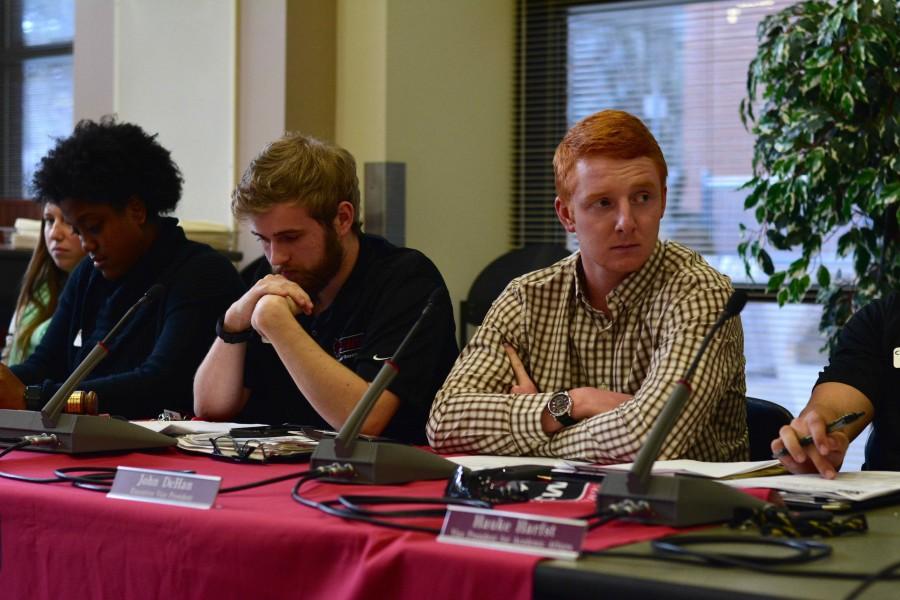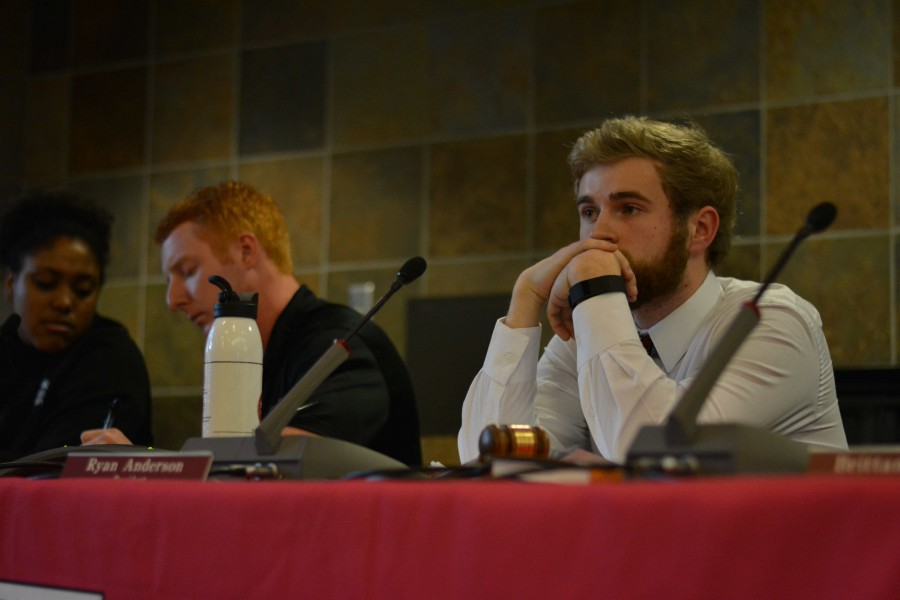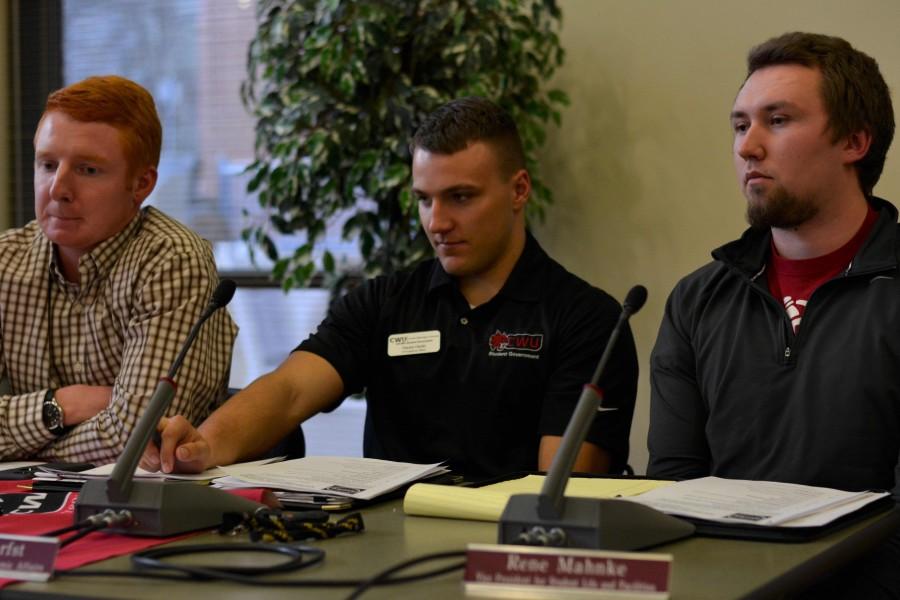ASCWU back pedals on decision to cast recall election, President Anderson stays in office
Private meeting with provost causes ASCWU Student Government board to quickly change their minds
March 3, 2016
After a private meeting Monday with Interim Provost Stephen Hulbert and Executive Director of Public Affairs Linda Schactler, the Associated Students of CWU (ASCWU) Student Government members decided not to move ahead with their planned recall election of President Ryan Anderson.
The decision came after months of deliberation between the board and President Anderson spanning back to Nov. 1, when a series of letters and correspondence shed light on growing tension.
Olivia Durham, vice president for Equity and Community Affairs, said Anderson had agreed on Friday at 4:45 p.m. that he would resign on Monday during ASCWU’s public meeting. Before leaving the meeting, he said the only thing holding him back was a letter drafted by Saudi Student Association members thanking him for his help earlier in the quarter.
“You could tell that behind that, it was an emotional thing for him,” Durham said. “My response to that was, I told him that I didn’t want him to feel as though he needed to have a position in order to make differences in people’s lives.”
The board said they were told that immediately after that meeting, Anderson went straight to the provost and told him that he felt as though the board cornered him and forced him into his resignation.
“I had students come up to me and say, ‘What happened? We did not expect this'”
Anderson said that he only told the board he would resign because he “really wanted to the leave the room” and that he never “specified which Monday” he would resign.
“I had publicly stated I would not resign for reasons put in the letter, so I wanted to stick with that because that was my decision,” he said. “I didn’t think it was up for debate.”
Anderson said he never went to the provost that day. Over the weekend, he said he’d received a call from Dean of Student Success Sarah Swager, where he says she told him that she had talked to Provost Hulbert about the meeting and that Hulbert wanted to schedule a meeting with the board.
Provost Hulbert said this is one of the only times he’s ever gotten personally involved in a quarrel between student governments he’s overseen.
“This ‘he said she said’ is not productive,” Hulbert said. “There is an enormous amount of passion between these seven individuals, and this clouds any conversation.”
But others on the board disagreed with the administration’s involvement with the matter, especially since this was an issue involving only students.
“We thought this was a student issue, an issue that we could handle,” said Nina Caldwell, vice president for Legislative Affairs. “We thought Friday ‘Okay, we’re actually finally going to be able to handle this,’ and then Monday came and we’re back to where we were [last] Monday.”
Private Meeting
Monday’s meeting was held at 7:30 a.m. in Barge Hall, where Schactler and Provost Hulbert work, and was described by ASCWU officers as “uncomfortable” and filled with “tension.”
During the course of the hour-long meeting, ASCWU officers said it was mostly filled with Hulbert describing to the board how they’ve broken their own code of ethics. They also said he raised his voice multiple times, and that some members couldn’t even get a word in.
“We had no idea going into this meeting what the tone or the purpose of the meeting was, or anything like that,” Durham said.
“We didn’t say much,” said Brittany Kinsella, vice president for Clubs and Organizations. “We probably said about five sentences.”
“I didn’t,” Durham added. “I got interrupted every time.”
Hulbert was described as becoming agitated. Durham said at one point he had an outburst, slamming his portfolio down on the table while saying, “This is my meeting. Meeting adjourned.”
 McKenzie Lakey
McKenzie Lakey
“There wasn’t, in my recollection an enormous amount of shouting,” Hulbert said. “I did raise my voice at one time when there was disagreement.”
Durham said Provost Hulbert had documents prepared, including some of the correspondence between the board and Anderson. She said that he also had text messages that she had sent to Anderson privately.
Durham said the texts were about the Student Governance Summit held on Saturday, Feb. 27 that she took over after the vote of no confidence. She said the provost used those texts as an example of her breaking the ASCWU’s code of ethics.
“Not that he was going to take our side. That someone of his authority would respect our side,” Durham said. “He doesn’t even know my name.”
When asked where he received those texts from, Provost Hulbert said he had received them from a faculty member. When asked which faculty member, he said he could not remember. He also said they were sent to his personal email, and not his work email: [email protected].
When asked to see them, Provost Hulbert said he couldn’t show them. He said it would be up to the faculty to release them. Durham was unsure which faculty member would have access to those texts, since she never sent them to anyone, not even the ASCWU advisers, Associate Dean for Student Development Keith Champagne and Dean Swager.
As it turns out, Anderson had sent them to Christina Denison, assistant director of the Douglas Honors College, and Anderson’s mentor.
“She said she should have those because it was a violation of student code of conduct,” Anderson said. “She said she needed to report them.”
The most updated Student Conduct Code available online.
Other members on the board had issues with the meeting as well.
“To be honest, I think the administration had too much of a hand in this situation,” said Executive Vice President John DeHan. “It seems like every time we wanted to make a decision they pulled the reins back on us like, ‘Whoa whoa whoa, settle down. Let’s have an emergency meeting.’”
Throughout the hour-long ordeal, the board said it was never clear whether or not Anderson would still resign at 5 p.m. later that day during the public meeting. Anderson’s parents sat outside of the meeting as well, in a separate room.
“I felt like Provost Hulbert definitely got upset,” Anderson said. “But I think, also, I don’t know, I feel like listening wasn’t happening from either side.”
What’s next?
Once it was over, some board members went back to their office in the SURC and hashed out what to do next.
“I [was] pretty busy until the public meeting, so coming up with a decision was like ‘Oh my God, what are we going to tell the public now with all of this pressure bearing down on us from the top?’” said Hauke Harfst, vice president for Academic Affairs. “We could say that we made an emotional decision.”
The board decided it would be best to not move ahead with a recall election, citing Provost Hulbert’s reasoning of it muddling with the general election and upcoming students moving into office next year.
After the public meeting, students were critical of the board on flip flopping from last week’s decision. There were also posts on the anonymous social media app, Yik Yak.
 McKenzie Lakey
McKenzie Lakey
“I had students come up to me and say, ‘What happened? We did not expect this,’” said Rene Mahnke, vice president for Student Life and Facilities. “They called us puppets on [Yik Yak]. That was tough for me.”
Several other officers echoed this sentiment, saying they agreed with students.
“I think they’re right honestly,” Durham said. “That’s exactly how I felt in this meeting leaving that. I felt defeated. That was unfortunate.”
Moving forward for the rest of the year, the board said they continue to not have confidence in Anderson’s ability as president and they said that generally, they will not be working with him unless it’s on projects that require cooperation.
“In terms of a vote of no confidence, great, they’ve made their statement. It doesn’t mean we can’t come together as a team,” Anderson said. “I don’t let the vote of no confidence define who I am as a leader.”
But for the other board members, it’s not as simple.
“We have no confidence in his abilities still,” Durham said. “And it’s going to be a long road I guess to figuring out how he can actually fulfill his duties.”
McKenzie Lakey and Julia Moreno contributed to reporting for this story.

